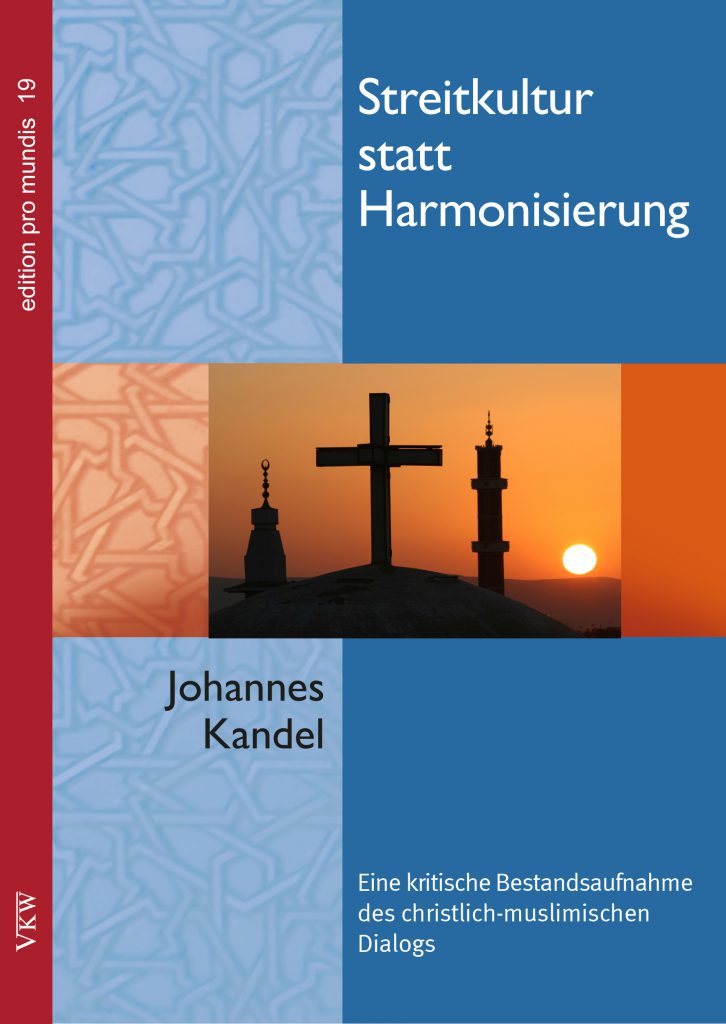Johannes Kandel publishes an “issue-specific outline with critical comments on the Christian-Muslim Dialogue in Germany”
After releasing his book Islamism in Germany, the Berlin political scientist Johannes Kandel has now published a critical history and discussion of the interreligious dialogue with Muslim associations in Germany.
 The author defines interreligious dialogue normatively as an ensemble of intentional interactions and communication between members of different religions and concentrates on the stages of development of the Christian-Muslim dialogue in Germany. He presents an issue-related outline with critical comments on the Christian-Muslim dialogue and comes to the conclusion that the Christian-Muslim dialogue is shaped by a significant basic socio-political motive. It is about peace, justice, and the preservation of the creation. Religions can make a significant contribution if they find a basic consensus regarding the secular status of the state, human rights, democracy, and pluralism. The dialogue between Christians and Muslims must not, for the sake of peace, harmoniously cover up problems and conflicts; rather, it must be structured as a critical culture of debate.
The author defines interreligious dialogue normatively as an ensemble of intentional interactions and communication between members of different religions and concentrates on the stages of development of the Christian-Muslim dialogue in Germany. He presents an issue-related outline with critical comments on the Christian-Muslim dialogue and comes to the conclusion that the Christian-Muslim dialogue is shaped by a significant basic socio-political motive. It is about peace, justice, and the preservation of the creation. Religions can make a significant contribution if they find a basic consensus regarding the secular status of the state, human rights, democracy, and pluralism. The dialogue between Christians and Muslims must not, for the sake of peace, harmoniously cover up problems and conflicts; rather, it must be structured as a critical culture of debate.
Dr. phil. Johannes Kandel was born in 1950 in Berlin. He is a political scientist and historian, a lecturer and freelance author. He is a member of the board of trustees of the Institute for Research on Religious and Ideological Issues (Evangelische Zentralstelle für Weltanschauungsfragen, or EZW). From 1999 to 2014 he was head of the Friedrich Ebert Foundation’s Intercultural Dialogue department in Berlin. He is the author and editor of several books on multicultural society and religion and violence, most recently Islamism in Germany.
Bibliographic information:
- Johannes Kandel. Streitkultur statt Harmonisierung: Eine kritische Bestandsaufnahme des christlich-muslimischen Dialogs [‘Culture of conflict instead of Harmony: A critical Inventory of the Christian-Muslim Dialogue’]. Verlag für Kultur und Wissenschaft: Bonn, 2015. 244 pp. Pb. €18.00 [Germany]. ISBN 978-3-86269-039-8.
Interview
Bonner Querschnitte: Mr Kandel, you are in favor of dialogue between Christians and Muslims and have co-organized or joined many dialogue events, and yet you are very critical of most of the dialogue that takes place. Why?
Kandel: Because the theological differences between Christianity and Islam are often not pointed out clearly enough and central Islamic positions on jihad, on apostasy (apostasy with respect to Islam), on the question of women’s rights, and on the life Christian minorities experience under Islam are played down. It is not clearly stated that there are doctrines and religious practices in Islam that are unacceptable from a human rights point of view. And frequently the connection between Islam and Islamism is denied.
BQ: You demand that dialogue must also be a “culture of debate” and not “harmonious.” Can you make this clear by using a topic as an example?
Harmony, for example, would be to pretend that all of us, Christians and Muslims, speak about the same God. Or that Abraham was the father of all of us. Also, the quite different concepts of democracy (in Islam “Shura,” i.e., consultation with a politico-religious elite), human rights (conditionally in Islam under Sharia) and peace (achieved in Islam when all are Muslims) should be addressed.
BQ: What are the essential prerequisites for a meaningful dialogue?
The religious identity of one’s own position and the competence to compare religions, the ability to engage in discussion, the capacity for a culture of debate.
BQ: In your experience, with what approaches and preconditions do Muslim dialogue partners enter into dialogue?
If Muslims are in the minority position, dialogue often pragmatically serves to strengthen the Islamic community by participating in important areas of society. Dialogue is also often regarded as a precursor or even part of the “Da’Wa” (invitation to Islam, “mission”). If Muslims are in the majority position, the dialogue serves the proclamation and spread of the “true religion”, Islam.
BQ: What is your greatest wish that you would like to see in politicians and church representatives engaged in dialogue?
Perception of Islam as it really predominantly exists, regardless of all its internal differences. No trivialization or glossing over of the dark sides of Islam. And the ability to argue productively about the truly epochal issues: justice, safeguarding creation, democracy, peace, and human rights.
Downloads:
- Front Cover (JPG)
- Cover (PDF)
- Table of Contents (PDF)
- Photo of the Author (JPG)
Leave a Reply